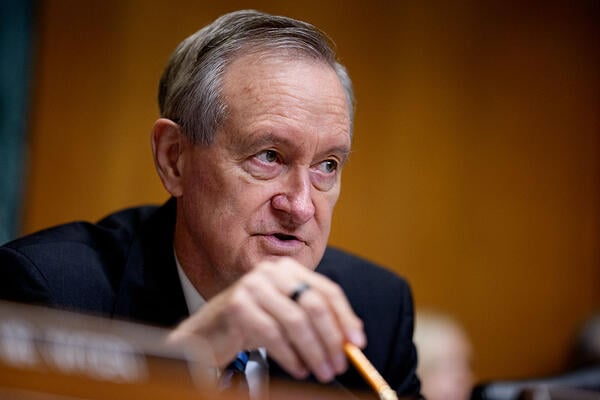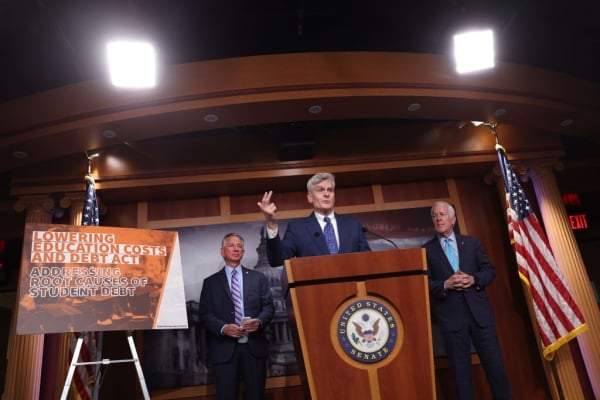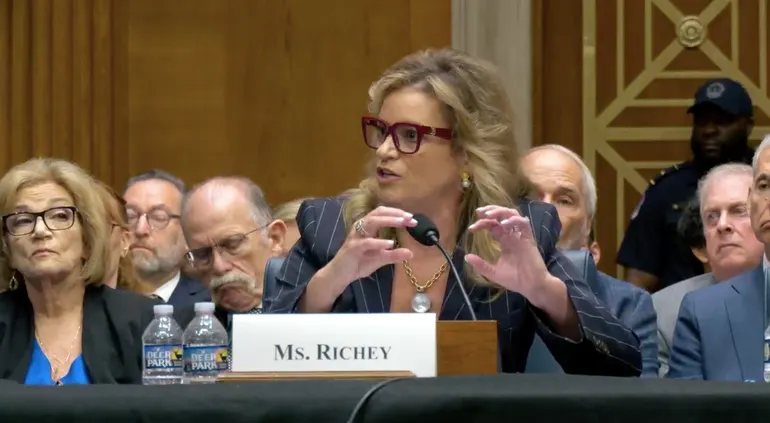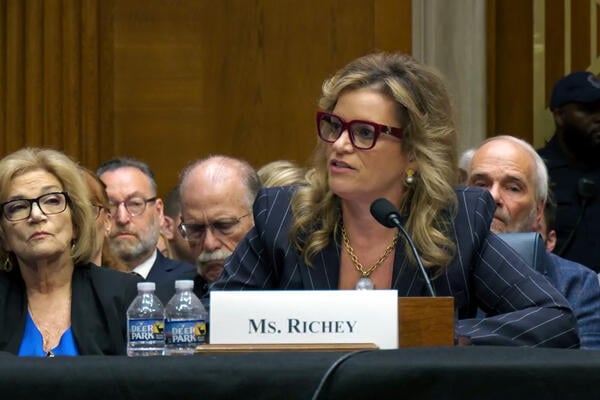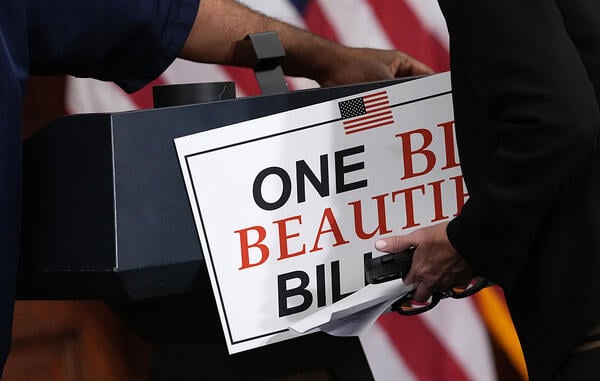More than a week after the Senate education committee released its draft plan to overhaul the federal student aid system, higher education leaders across the sector are still breathing a sigh of relief over key provisions concerning how to hold colleges accountable for student outcomes.
The high chamber’s proposal, which ties a university’s access to federal loans to how much their students earn after graduation, is simpler and more productive than the House proposal, known as risk-sharing, which would require colleges to pay an annual penalty based on their students’ outstanding loan balances, they say.
“More than any other factor, a program having low earnings is the thing that is most connected with the prevalence of students defaulting or struggling to pay down their loans,” said Jordan Matsudaira, director of the Postsecondary Education and Economics Research Center at American University. “This is a serious and sensible proposal to establish what I think of as a very necessary accountability in the higher education space.”
The Senate plan seems to be based on an existing regulation known as gainful employment, which uses students’ earnings and debt to measure whether for-profit and non-degree programs adequately prepare their students for the workforce. But Republicans who sponsored the bill and expanded its reach to all degree programs have been wary of drawing attention to the overlap, as lawmakers have avoided calling it anything like “gainful employment 2.0” or “gainful for all.”
Republicans have historically opposed the Democratic policy, which was first put in place during the Obama administration, saying it unfairly targeted for-profit programs and that a free market would be the best way to regulate the quality of academic programs. (The first Trump administration rescinded the policy, and then the Biden administration enacted a stricter version that remains in place today.)
But now, as congressional Republicans grow increasingly concerned about student debt and skeptical of higher education, some have started to change their tune.
Some say the Senate’s proposed earnings test is likely to succeed and become law, as it’s the lesser of two evils and aligns more with a conservative federalist ideology when compared to the House’s plan. But others view this new accountability measure as just that—new.
“They’re not looking at the Biden gainful-employment rules and saying, ‘Oh, this was a good thing. Let’s do it like they did.’ They’re taking a different approach,” said Jason Altmire, president of Career Education Colleges and Universities, the national trade association representing for-profit institutions, which criticized the Biden regulations. He also noted that including all types of colleges is “a huge difference from the way the two last Democratic administrations approached gainful employment.”
Either way, the provision is now up for consideration as part of a broader legislative package—the One Big Beautiful Bill Act—that would cut spending in order to finance Trump’s tax cuts and immigration policies. The House bill passed by a one-vote margin last month; now, senators are aiming to pass their version by July 4.
Since lawmakers are using a process known as reconciliation, they only need 51 votes to pass the bill in the Senate, down from the typical 60 votes. But it also means the legislation has to adhere to a specific set of rules.
Some policy experts question whether the Senate’s accountability measure for colleges will pass the sniff test. If it does, they expect the proposal to be included in the final bill.
How Does It Work?
The crux of the Senate’s accountability measure is tracking the median earnings of students program by program and comparing them to the average earnings of adults ages 25 to 34 with only a high school diploma. If students don’t earn more than adults without a college degree for two out of three consecutive years, then the program would lose access to federal loans for at least two years.
Earnings for baccalaureate degree programs will be measured four years after a student leaves the program regardless of age—a time frame that some experts say is too short to truly gauge a program’s value. Meanwhile, the median income of high school graduates would not be evaluated until they hit at least 25 years old, or seven years after the typical high school graduation. Some higher ed lobbyists say that comparison isn’t fair.
“You’re comparing a 23-year-old, let’s say, cosmetology graduate just getting started with her book of business to a 34-year-old flight attendant who’s been on the job for 16 years who only has a high school diploma,” Altmire said.
A similar process would be used for graduate and professional programs, except the income level would be compared to adults with a bachelor’s degree and earnings will be evaluated further out from when the student left the program.
The Senate hasn’t released any data on its plan, but studies on the Biden gainful-employment rule offer some insights into which types of college programs could be affected most.
Data collected by the Department of Education in 2022 showed that about 1.3 percent of programs not currently subject to gainful employment would fail. About half of the programs failed because of the earnings test, according to an Inside Higher Ed analysis of department data.
Other studies show that of those programs, the ones most impacted will likely be graduate studies and for-profit bachelor’s degrees. For example, about 20 percent of students in each of these sectors failed the Biden earnings test, said Matsudaira, who worked for the Department of Education during the Biden administration and is very familiar with gainful employment. That’s compared to only about 4 percent of nonprofit bachelor programs.
Altmire, from CECU, however, disagreed. He pointed to a 2023 study conducted by Monroe College, a for-profit institution, which showed that nearly 90 percent of the undergraduate degree programs that would fail the earnings test are at public and private nonprofit colleges.
But just because more nonprofit colleges fail doesn’t mean they have a high rate of failure proportionally, Matsudaira responded.
“About 90 percent of enrollment is in the nonprofit sector, and only 10 percent of enrollment is in the for-profit sector, so of course, that should tilt in the direction of the nonprofit sector,” he said. “I would think about it a little bit more within each one of those sectors.”
A Fairer Gainful?
The Senate plan does keep the current gainful-employment rules in place while House Republicans want to repeal them. The Trump administration is currently defending the regulations in federal court, but a judge could throw them out.
Still, policy experts cautioned against thinking of the Senate proposal as an add-on to Biden’s version of gainful employment.
“I think it would be inaccurate to say the Senate took the Biden gainful-employment rules and tinkered around the edges,” Altmire said. “They took one concept from the Biden rules but then did a lot of other things that greatly improved that concept and made it more fair across all schools.”
Beyond covering all degree programs, the Senate plan doesn’t specifically include credential programs, which currently fall under gainful employment. That’s a change that some experts say is a mistake, especially when the Senate is looking to expand the Pell Grant to cover some of these credentials. However, that plan comes with its own guardrails.
“Certificates, beyond any other type of program, are most typified by extremely low earnings, and having those low earnings leads to a lot of loan defaults over all. So the fact that the Senate proposal ignores the certificate space altogether is baffling,” Matsudaira said.
The Senate also changed the test itself. This version only measures a student’s earnings, while the Biden rule measures both income and whether students can pay off their loans. Furthermore, the Senate’s calculation includes all program enrollees, regardless of whether they completed their degree. The current gainful-employment regulations only count completers.
Of these changes, the most debated has been whether to include in the earnings calculation students who stopped out before completing their degrees.
Some policy experts argue that it’s fair to hold colleges accountable only for the earnings of students who complete their degree programs. If the goal is also to increase degree completion, that’s great, they say, but it should be handled through a separate provision than the one focused on return on investment.
“If the goal is to actually measure the ROI, we should be looking specifically at those who earned a degree,” said Craig Lindwarm, senior vice president for governmental affairs at the Association of Public and Land-grant Universities. “There are a lot of other ways of supporting efforts to boost college completion, like investment in the Postsecondary Student Success Grant program.”
But others say it is entirely fair.
“You shouldn’t be rewarded when a student chooses your school, takes a bunch of financial aid, doesn’t complete the program,” said Altmire from CECU. “That makes no sense.”
That said, higher education leaders from all sectors of the industry are generally pleased with the proposal and say it shows that the Senate has been listening to their concerns.
“We’re encouraged that the Senate is heading down a more productive path,” one collegiate lobbyist said. “This is a much fairer, simpler and [more] effective approach to accountability.”




